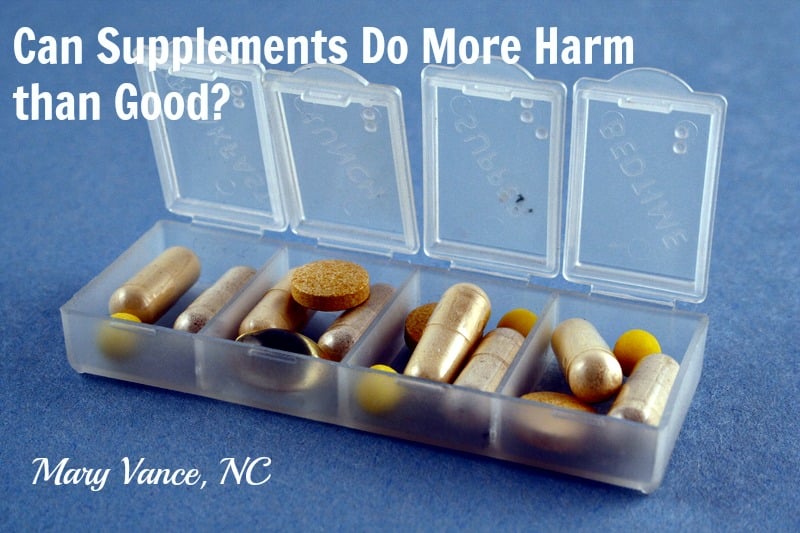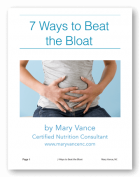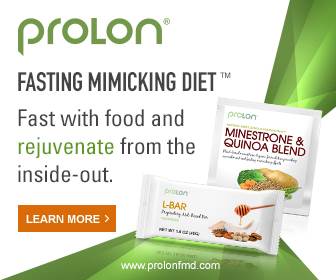Think you’re doing a body good when you pop your daily multi? That depends. It is possible to get too much of a good thing. Studies have cropped up linking beta carotene (often added as part of vitamin A in your vitamin supplement) to increased cancer rates in smokers. And there has been some controversy about whether taking too many antioxidant supplements can actually increase your cancer risk. Antioxidants (vitamins A, C, E, zinc, and selenium) will help prevent cancer by eliminating free radical damage on a cellular level. That’s definitely true of antioxidants from food sources, but what about supplements? Do you need them? Are they harmful?
Most people think that if a little is good, a lot must be better. One example: the magic bullet soy craze. Once the food industry began slapping heart healthy labels on soy foods (a label the American Heart Associate later retracted), we went nuts for soy. The food industry swung into high gear to manufacture processed soy products containing high levels of isoflavones purported to ease menopause and lower cholesterol. Many experienced thyroid and hormonal problems from taking soy isoflavone supplements, soy protein powders, soy milk, and refined soy foods with isolated soy protein. More is not better (Asian cultures only ingest about 9 grams of whole soy–not processed–daily), and more isn’t better when it comes to isolated forms of synthetic vitamins.
Most over the counter vita-mineral supplements that you buy from the drug store are low quality, contain dyes and filers, and offer mega doses of synthetic vitamins and minerals. Fat soluble vitamins, such as A and D, have the potential to build up in fatty tissue and cause toxicity (though this is not the norm.) They are almost always made with GMO ingredients like corn. These vitamins are formulated in a lab and are not natural (did you know that most vitamin C is extracted from corn, then lab-altered?). The body has trouble processing anything synthetic, and vitamins are no exception. Some supplements are not even able to be broken down by the body. TIP: place your multi in a small glass of water or water with lemon or vinegar. Doesn’t dissolve? Well, it’s not dissolving in your body, either. Herbs in particular are standardized, which means you’re only getting a certain percent of the most potent parts of the plant, and sometimes that percent is very weak.
The other issue is taking isolated supplements, like calcium, for example, which can do more harm than good if not taken in balanced ratios as they exist in the body. Excess calcium, when not balanced with magnesium, can create calcification. Certain other vitamins and minerals need to contain co-factors so they’re absorbed properly. One example is vitamin C, which isn’t absorbed well without bioflavinoids.
Vitamin supplements have come under fire for having low efficacy (read: they don’t work). While this may be true for the particular low grade supplements used in studies, this is certainly not true for all supplements. All supplements are not all created equally, and some are better than others.
Are multi vitamin supplements bad? And do they work?
The answer is no and yes. It’s best to get what you need from a whole foods diet with plenty of brightly colored fruits and veggies and leafy greens. But the fact is, many people aren’t able to eat a balanced and nourishing diet that meets his or her nutritional needs. Food processing methods and cooking can destroy vital enzymes and nutrients, and modern farming production, including use of fertilizers, pesticides, and depleted soil can result in fruits and vegetables lacking in nutrient density. A multi can help you meet your nutrient needs, especially if you are under stress and need extra nutritional support.
What Supplements Should I Take?
Look for a food-based supplement: absorption rates are higher since they’re bound with natural chelation elements. Avoid mega doses of anything. The body can only absorb 500mg of vitamin C at a time, and the rest is excreted, so sometimes mega doses of vitamins are useless anyhow. Read labels. It’s best to consult with a health professional. He or she will have access to physician-only supplements that far exceed the quality and efficacy of anything you buy over the counter; these are supplements that have certificates of quality and high standards from the companies that produce them. A professional will also be able to recommend certain dosages of vitamins or minerals based on your concerns. Do not self-diagnose — it can do you more harm than good.
I recommend this multi because it doesn’t contain mega doses of synthetics, and it offers the proper forms of vitamins needed for optimal health. I’ve been using it and LOVE it. Finally, don’t use your multi as a crutch. You assume your mutli will fill in the gaps, so you don’t have to focus so much on food. It’s the other way around: focus on a superior diet and rely on a multi to fill in the nutritional gaps. The fact is, it’s nearly impossible to get the minerals, B vitamins, D and essential fatty acids your body requires through diet alone. So, a multi can most definitely enhance your health — but choosing the right one is key.
Here are the Supplements I recommend for Health
Generally everyone fares well taking the below supplements, but remember: quality matters. Don’t spend your money on a poor quality product.
- I recommend this multi for everyone.
- A probiotic is always a good choice, in addition to probiotic foods
- Essential fatty acids are a must. Nordic Naturals is a good choice.
- D vitamin is a good choice too– most people are deficient. Look for one with vitamin K co-factors (like this one)
As I mentioned, it’s best to consult with a nutritionist or other practitioner to help determine if you have any deficiencies.

Mary Vance is a Certified Nutrition Consultant and author specializing in digestive health. She combines a science-based approach with natural therapies to rebalance the body. In addition to her 1:1 coaching, she offers courses to help you heal your gut and improve your health. Mary lives in San Francisco and Lake Tahoe in Northern California. Read more about her coaching practice here and her background here.







Hi Mary!
I know we haven’t spoken in a long time, but your website was my first stop when looking for recommendations for a fish oil supplement. This article is right on time – thanks so much!